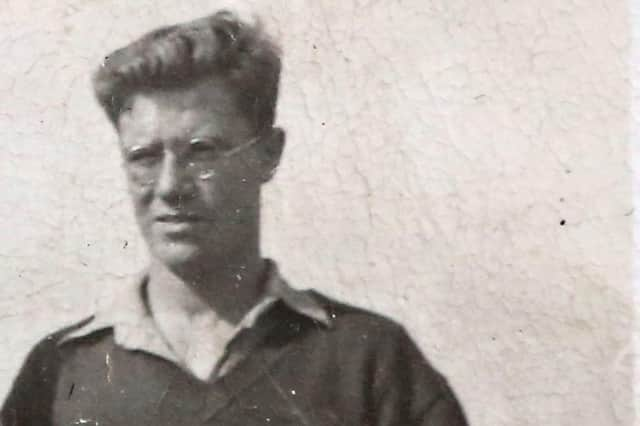Obituary: John Webster, Scottish mechanic, soldier and daredevil


John Webster was a daredevil former Desert Rat who served at El Alamein and parachuted into Yugoslavia to support the resistance.
He’d never thrown himself out of a plane before he was dropped in to aid the partisan offensive near Split during World War 2– his only training was leaping from a makeshift structure onto a mat.
Advertisement
Hide AdAdvertisement
Hide AdAnd though he injured his ankle in the hazardous jump into enemy territory, it didn’t put him off: he planned to skydive again for his 100th birthday, a stunt only foiled by the coronavirus pandemic and just the latest in a long line of exploits that included abseiling aged 79, wing walking aged almost 86 and sailing at 88. Even at the age of 98 he was still playing table tennis.
The son of First World War signals officer, James Webster and his wife Mary, he was born in Rutherglen, later moving to Carmunnock (correct) where he was educated at the local primary school before attending Rutherglen Academy.
His older brother already had a garage business in Busby and young Webster joined him there to train as a mechanic before enlisting in 1940, originally in the Royal Army Ordnance Corps. He went on to serve with the Royal Electrical and Mechanical Engineers (REME) from its inception, repairing, recovering and fitting armoured vehicles.
Posted to the Middle East with 1st Armoured Division Workshop, he learned how to drive and mend tanks in Alexandria, Egypt, with the 8th Army. During two years in that theatre he served in both battles of El Alamein and experienced an extraordinary episode in which he unwittingly came within a rifle shot of Rommel, the Afrika Korps commander.
Webster’s work party had been ambushed while repairing tanks. Shot up and forced to scatter, he was one of a small group left behind, hotly pursued by the enemy. However he managed to take cover and watched from his hiding place as small plane flew over and landed no further than “a long rifle shot away”. A staff car approached the aircraft, two men alighted and another descended from the plane. After a conversation the two men saluted the visitor who returned the salute. The car sped away as their superior returned to his plane and took off.
It was only later Webster realised the visitor was Rommel, the Desert Fox, who was said to have a habit of flying in to recce his troops and the enemy action. “I saw a picture of him and that was who it was.”
Rommel was defeated at the second battle of El Alamein and after the Allied victory Webster was posted to North Africa. He served in Tunisia and Libya in heat so fierce it melted the fat in his tins of corned beef. To conserve precious water the troops washed their clothes in petrol, a tactic, he recalled, that also kept bugs and lice at bay.
He also recollected being shot at and drenched in blood after salvaging an armoured car. He escaped with only shrapnel grazes then but on another occasion witnessed a horrific incident when a shell landed down the turret of a nearby tank, killing a friend. “The worst thing is hearing someone burn to death. You dream about it.”
Advertisement
Hide AdAdvertisement
Hide AdIn 1945 he was attached to a workshop unit with Central Mediterranean Force when he parachuted, under cover of darkness, into German-occupied Yugoslavia to aid the resistance.
Despite his injury on landing he managed to walk to the rendezvous point and subsequently lived in the hills outside Split, supporting the partisans, until being shot in the hand during an ambush. Evacuated to the Italian port of Taranto for surgery, he was recovering from the operation when he heard of victory in Europe and spent most of VE Day in bed.
After the war he was posted to Germany with the British Army of the Rhine before being demobbed in 1946 and returning home to manage a garage in Clarkston. He met his wife Pat, who was a younger neighbour, when her father asked him to teach her to drive. They married in 1959 and had two daughters.
In 1960 he went to G & J Weir, now the Weir Group, as an expeditor, and in 1976 the family relocated to Tain after he encouraged his wife to apply for the headship of a primary school there.
From then he had various jobs but particularly enjoyed being a supervisor for the Youth Training Scheme. After retiring at 64 he took on occasional duties as relief driver of a mobile banking van.
A keen sportsman – he had been a gifted footballer in his youth, guesting for Crystal Palace – he remained active, playing badminton and golf, taking flying and gliding lessons and abseiling down Dunrobin Castle.
That spirit of adventure kept him so young no-one ever believed his age and he maintained his action man image when, at almost 86, he took to the air to raise thousands for charity with a wing walk.
But it didn’t quite live up to the total experience he had envisaged. He hadn’t been able to loop-the-loop or enjoy the adrenalin rush of a steep banking manoeuvre. “They were too gentle with me,” he declared.
Advertisement
Hide AdAdvertisement
Hide AdHe is survived by his wife Pat, daughters Janice and Anne, three grandsons and a great granddaughter.
Obituaries
If you wish to submit an obituary, or suggest a subject, contact [email protected]
A message from the Editor
Thank you for reading this article. We're more reliant on your support than ever as the shift in consumer habits brought about by coronavirus impacts our advertisers.
If you haven't already, please consider supporting our trusted, fact-checked journalism by taking out a digital subscription.